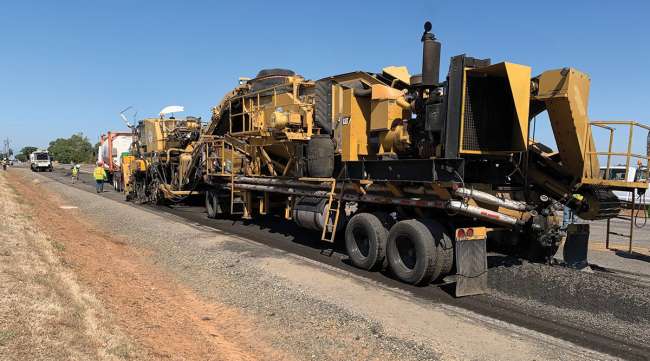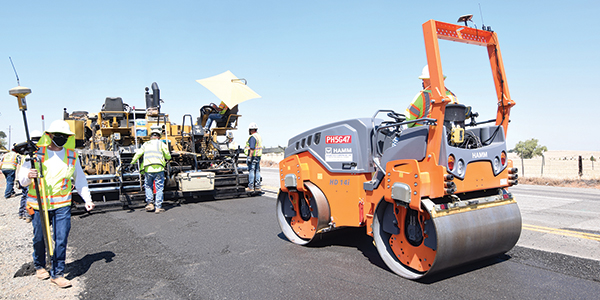Staff Reporter
Caltrans Turns to Recycled Bottles for Repaving Project

[Stay on top of transportation news: Get TTNews in your inbox.]
The California Department of Transportation is repaving a segment of a state highway using only recycled materials in a pilot project.
The agency is using recycled asphalt pavement and liquid plastic made from disposable bottles to repave a section of state Route 162 in Oroville, which is about 70 miles north of Sacramento. Specifically, the $3.2 million project covers a stretch of SR 162 that runs between the Feather River and Christian Avenue.
This project marks the first time Caltrans has paved a road using completely recycled materials. The agency estimates that, using this treatment, a 1-mile segment of pavement will repurpose 150,000 plastic bottles.

Hueso
“California has set ambitious goals for recycling and other environmental priorities, and meeting them requires innovative and cost-effective solutions,” said Sen. Ben Hueso (D-San Diego). “Using waste plastic that was otherwise destined for a landfill will not only reduce the cost of road repair and construction, but also increase the strength and durability of our roads.”
Tests of plastic-based paving material have indicated it is more durable than traditional hot mixed asphalt and lasts two or three times as long.
Caltrans currently uses a cold in-place asphalt recycling program, a rehabilitation process through which existing pavement materials are reused in place. According to the Federal Highway Administration, this technique involves milling or crushing the existing pavement, mixing the reclaimed asphalt pavement with aggregate or a recycling agent and then laying down the mixture. This process can restore old pavement and eliminate ruts and potholes. FHWA’s pavement recycling guidelines indicate the cold in-place recycling system can save costs and minimize traffic disruptions.
Section of California state Route 162 that will be repaved using the new method in Oroville, with Christian Avenue marked with a pin in the center and the Feather River visible on the right. (Google Maps)
Caltrans’ cold in-place asphalt recycling system uses large machines to remove between 3 and 6 inches of roadway surface. The pieces of roadway are ground up and mixed with a foamed binding agent made of bitumen. The recycled material used in this process only suffices for the roadway’s base; trucks are required to haul in hot mixed asphalt, which is layered over the base.
But with the new technology, a recycling train of equipment grinds up the top 3 inches of pavement and mixes the grounds with a liquid plastic polymer binder formed from recycled disposable bottles. The new material is placed on the top surface of the road, meaning trucks don’t need to haul in outside material to contribute to the operation.
According to Caltrans, eliminating the need to haul asphalt to the work site can reduce greenhouse gas emissions.
“We’re excited about introducing a new sustainable technology and helping pave the way for utilization of recycled plastics throughout the state,” Caltrans District 3 Director Amarjeet Benipal said. “This process is better for the environment because it keeps plastic bottles out of landfills and helps reduce greenhouse gas emissions and reliance on fossil fuels.”

Caltrans said eliminating the need to haul asphalt to the worksite can reduce greenhouse gas emissions. (Caltrans)
Caltrans’ District 3 lies in the northern part of the state and encompasses 11 counties, including Sacramento County. According to Caltrans, the department is testing the material for later use in other projects throughout the state.
“This pilot project underscores the department’s commitment to embracing innovative and cost-effective technologies while advancing sustainability and environmental protection efforts,” Caltrans Director Toks Omishakin said.
Want more news? Listen to today's daily briefing:
Subscribe: Apple Podcasts | Spotify | Amazon Alexa | Google Assistant | More




